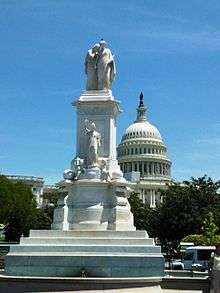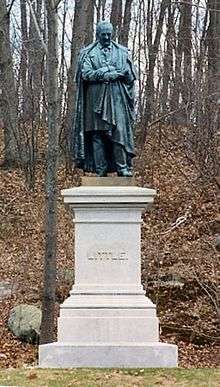Franklin Simmons


Franklin Bachelder Simmons (January 11, 1839 – December 8, 1913) was a prominent American sculptor of the nineteenth century.[1][2] Three of his statues are in the National Statuary Hall Collection, three of his busts are in the United States Senate Vice Presidential Bust Collection, and his statue of Ulysses S. Grant is in the United States Capitol Rotunda.
Biography
Simmons was born in Webster, Maine. He spent most of his childhood in Bath, Maine and Lewiston, Maine. He attended Bates College (then called the Maine State Seminary) in 1858. Simmons started sculpting and painting during childhood. He studied with John Adams Jackson.[3]
During the last two years of the American Civil War, he moved to Washington, D.C. and modeled 24 portrait medallions of President Abraham Lincoln, his Cabinet, and generals and admirals.[4] The Union League of Philadelphia purchased most of the medallions. In 1867 Simmons received an honorary A.M. from Bates College and from Colby.
Simmons went to live in Rome in 1868, but returned several times. Among his portrait busts are those of David D. Porter, James G. Blaine, Francis Wayland, and Ulysses S. Grant (1886). He is said to have made a female statue of The Wanderer, meant to depict a Jewess wandering in the desert.[5] He died in Rome, aged 74, and is buried in the Protestant Cemetery.[6]
Selected works
- Bust of Oren Cheney (1861?), Bates College, Lewiston, Maine. Simmons sculpted this while a student at Bates College.[7]
- Soldiers' Monument (1866–68), Kennedy Park, Lewiston, Maine.
- Soldiers and Sailors Monument (1867–69), Bellingham Square, Chelsea, Massachusetts.
- Penelope (marble, 1873), De Young Museum, San Francisco, California.[8] Copies are at the Berkshire Museum in Pittsfield, Massachusetts; Lake Delaware Farm in Delhi, New York; the Detroit Institute of Arts; and the Portland Museum of Art in Portland, Maine.[9]
- Jochebed with the Infant Moses (marble, 1873), Museum of Fine Arts, Boston, Massachusetts.[10]
- The Promised Land (marble, 1874), Metropolitan Museum of Art, New York City.[11]
- Roger Williams Monument (bronze, 1874–77), Roger Williams Park, Providence, Rhode Island. A bronze copy of his marble statue at the U.S. Capitol.
- Edward T. Little (bronze, 1875–77), Edward Little High School, Auburn, Maine.
- Bust of William B. Wood (marble, 1860), Lewiston Public Library, Lewiston, Maine
- Bust of Lyman Nichols (marble, 1860), Lewiston Public Library, Lewiston, Maine
- Bust of Admiral David Dixon Porter (marble, 1876), United States Naval Academy, Annapolis, Maryland.
- Miriam (year?)
- Medusa (1882)
- Galatea (1884)
- Senator Oliver P. Morton (bronze, 1884), Soldiers' and Sailors' Monument, Indianapolis, Indiana.
- The Seraph Abdiel (from "Paradise Lost") (1886).
- Henry Wadsworth Longfellow (bronze, 1887), Longfellow Square, Portland, Maine.
- Soldiers' Monument (1888–91), Monument Square, Congress Street, Portland, Maine, Richard Morris Hunt, architect.
- Bust of Robert Treat Paine (marble, 1892), Museum of Fine Arts, Boston, Massachusetts.[12]
- Equestrian Statue of Major General John A. Logan (bronze, 1892–1901), Logan Circle, Washington, D.C., Richard Morris Hunt, architect.
- Alexander Hamilton (bronze, 1905–06), Great Falls of the Passaic Overlook Park, Paterson, New Jersey.
- Valley Forge (Seated Washington) (bronze, 1910), Washington Memorial Chapel, Valley Forge, Pennsylvania.[13]
Union League of Philadelphia

- 14 bronze portrait medallions of Civil War generals and politicians (1865).
- President Abraham Lincoln
- Secretary of the Treasury Salmon P. Chase
- Secretary of State William H. Seward
- Major General Nathaniel P. Banks
- Major Gereral Ambrose Burnside
- Major General Benjamin F. Butler
- Major General Darius N. Couch
- Major General Abner Doubleday
- General of the Army Ulysses S. Grant
- Major General Winfield S. Hancock
- Major General Joseph Hooker
- Major General Philip Kearny
- Major General George Gordon Meade
- Major General John Grubb Parke
United States Capitol

- Peace Monument (formerly Naval Monument) (marble, 1877), United States Capitol Grounds, Washington, D.C., Edward Clark, architect.[14] The figures atop the monument are titled "Grief and History."
- Roger Williams (marble, 1872), National Statuary Hall Collection (representing Rhode Island).
- Governor William King (marble, 1878), National Statuary Hall Collection (representing Maine).
- Bust of Vice President Hannibal Hamlin (marble, 1889), United States Senate Vice Presidential Bust Collection.
- Bust of Vice President Adlai E. Stevenson (marble, 1894), United States Senate Vice Presidential Bust Collection.
- Ulysses S. Grant (marble, 1899), United States Capitol Rotunda. Simmons's 1894 statue, showing Grant in civilian clothes, was rejected for the U.S. Capitol. It is now in the Portland Museum of Art.[15]
- Bust of Vice President Charles W. Fairbanks (marble, 1905), United States Senate Vice Presidential Bust Collection.
- Governor Francis Harrison Pierpont (marble, 1910), National Statuary Hall Collection (representing West Virginia).
Gallery
 Soldiers and Sailors Monument (1867–69), Chelsea, Massachusetts.
Soldiers and Sailors Monument (1867–69), Chelsea, Massachusetts. Roger Williams (1872), United States Capitol, Washington, D.C.
Roger Williams (1872), United States Capitol, Washington, D.C.- Penelope (1873), De Young Museum, San Francisco, California.
 Roger Williams Monument (1874–77), Providence, Rhode Island.
Roger Williams Monument (1874–77), Providence, Rhode Island. Edward Little Memorial (1875–77), Auburn, Maine.
Edward Little Memorial (1875–77), Auburn, Maine. Governor William King (1878), United States Capitol, Washington, D.C.
Governor William King (1878), United States Capitol, Washington, D.C. Senator Oliver P. Morton (1884), Indianapolis, Indiana.
Senator Oliver P. Morton (1884), Indianapolis, Indiana. Henry Wadsworth Longfellow (1887), Portland, Maine.
Henry Wadsworth Longfellow (1887), Portland, Maine. Soldiers' Monument (1888–91), Portland, Maine.
Soldiers' Monument (1888–91), Portland, Maine. Ulysses S. Grant (1899), United States Capitol, Washington, D.C.
Ulysses S. Grant (1899), United States Capitol, Washington, D.C. Vice President Charles W. Fairbanks (1905), United States Capitol, Washington, D.C.
Vice President Charles W. Fairbanks (1905), United States Capitol, Washington, D.C. Alexander Hamilton (1905–06), Paterson, New Jersey.
Alexander Hamilton (1905–06), Paterson, New Jersey. Governor Francis Harrison Pierpont (1910), United States Capitol, Washington, D.C.
Governor Francis Harrison Pierpont (1910), United States Capitol, Washington, D.C. Civil War Memorial in Lewiston, Maine
Civil War Memorial in Lewiston, Maine
References
- ↑ "FRANKLIN SIMMONS DEAD. - American Sculptor Designecl Grant and Logan Monuments". The New York Times. 1913-12-09. Retrieved 2016-09-15.
- ↑ "Archived copy". Archived from the original on 2011-03-10. Retrieved 2011-02-23.
- ↑ "Archived copy". Archived from the original on 2011-02-22. Retrieved 2011-02-23.
- ↑ Dizionario degli Artisti Italiani Viventi: pittori, scultori, e Architetti., by Angelo de Gubernatis. Tipe dei Successori Le Monnier, 1889, page 480.
- ↑ De Gubernatis, 1905.
- ↑ "Archived copy". Archived from the original on 2013-02-07. Retrieved 2013-02-10.
- ↑ Lillian Whiting, "Franklin Simmons," The Twentieth Century Magazine, Volume 1 (Google eBook) (Twentieth Century Company, 1910), pg. 202
- ↑ "Archived copy". Archived from the original on 2011-07-26. Retrieved 2011-02-23.
- ↑ "Archived copy". Archived from the original on 2006-02-11. Retrieved 2006-01-27.
- ↑ "Jochebed (Mother of Moses) | Museum of Fine Arts, Boston". Mfa.org. Retrieved 2016-09-15.
- ↑ "Collection | The Metropolitan Museum of Art". Metmuseum.org. Retrieved 2016-09-15.
- ↑ "Portrait Bust of Robert Treat Paine | Museum of Fine Arts, Boston". Mfa.org. Retrieved 2016-09-15.
- ↑ Gobetz, Wally. "Pennsylvania - Valley Forge: Washington Memorial Chapel - …". Flickr. Retrieved 2016-09-15.
- ↑ "The Peace Monument | Architect of the Capitol | United States Capitol". Aoc.gov. Retrieved 2016-09-15.
- ↑ "Ulysses S. Grant, (sculpture)". Siris-artinventories.si.edu. Retrieved 2016-09-15.
External links
| Wikimedia Commons has media related to Franklin Simmons. |
- Art Cyclopedia List of Famous Works
- Universal Cyclopædia & Atlas, 1902 ed., New York, D. Appleton & Co.